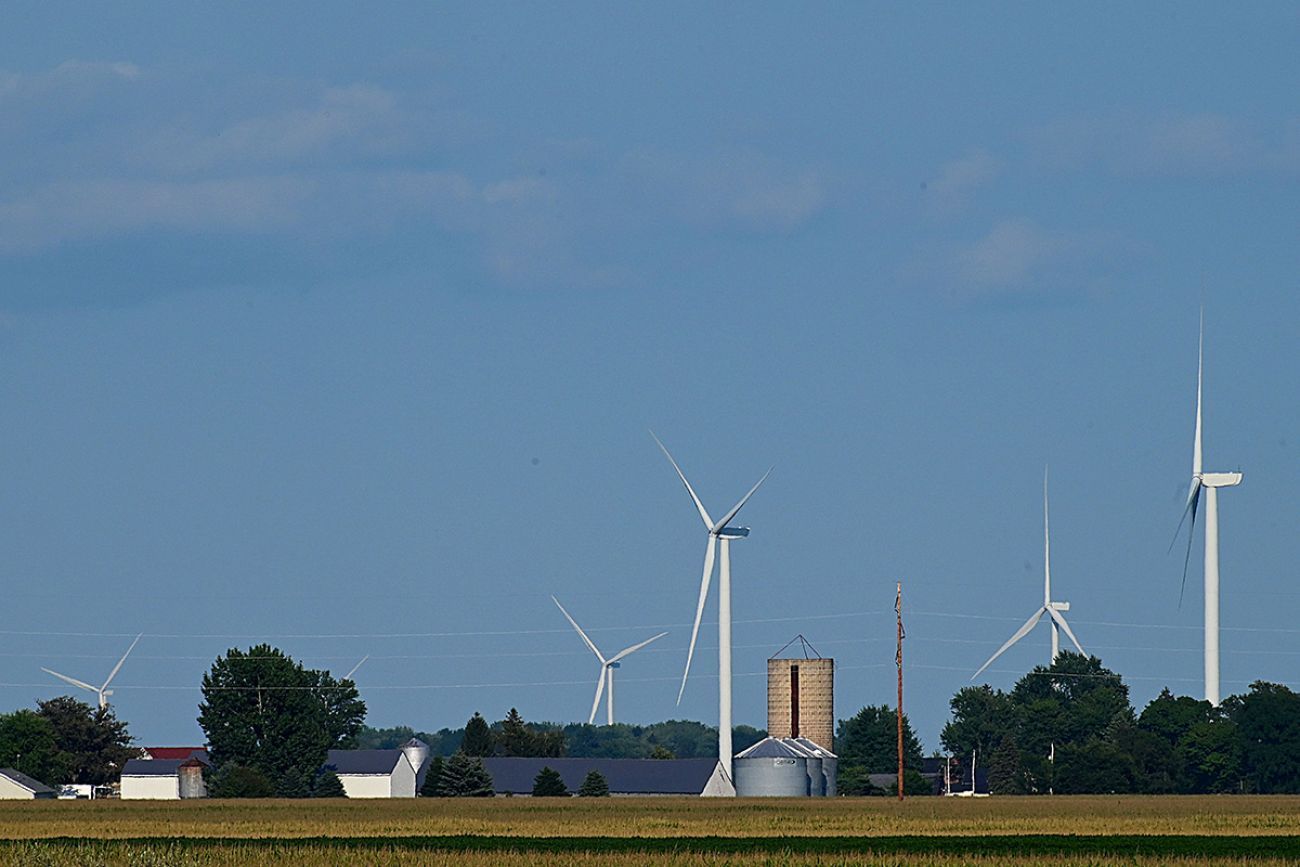Michigan House committee advances wind, solar permitting bills

- A House committee on Wednesday approved bills to shift control of large-scale renewable energy permitting to the state
- The bills now head to the House floor
- It’s part of a larger Democratic legislative push to speed up Michigan’s energy transition
A Michigan House committee on Wednesday advanced legislation that aims to speed up the development of wind and solar energy in Michigan by shifting permitting control from local government to the state.
In a 9-7 party-line vote with one Democrat abstaining, the House Energy, Communications and Technology Committee approved House Bills 5120-5123, which now go to the full House for consideration.
Identical bills were introduced in the Senate last week.
Related:
- Proposed state oversight of solar, wind pits energy needs v. rural rights
- With tensions rising, Michigan Democrats unveil clean energy reforms
- After local pushback, Michigan Dems seek state oversight of green energy
- Wind wars: Wind turbines put green energy on the ballot in mid-Michigan
The vote came after impassioned testimony from bill opponents, with one of them comparing the package to the emergency manager law that stripped towns like Flint and Detroit of the power to self-govern during times of financial crisis.
“It's an unfair and unjustified power grab,” said Clint Beach of Fowlerville, borrowing words that Gov. Gretchen Whitmer used in 2011 to oppose the use of emergency managers.
By supporting the energy siting legislation, Beach said, Whitmer “is trying to do the exact same thing that she so vehemently opposed just a few short years ago.”
Bill proponents, meanwhile, tout the package as a needed antidote to local conflicts that have doomed wind and solar projects across the state. Without a streamlined state process for vetting prospective renewable energy developments, they argue, Michigan may fail to swap fossil fuels for renewables by midcentury.
That's the deadline by which scientists say humanity needs to stop adding greenhouse gasses to the atmosphere, or risk increasingly dire consequences from climate change.
“If every individual local unit of government can block those projects, we end up without the projects that we need for Michigan,” Dan Scripps, chair of the Michigan Public Service Commission (MPSC), told lawmakers during a hearing last week.
Under the bills, Scripps and two other commissioners would be tasked with approving or denying large renewable projects in the state. As part of that process, they would have to consider what public benefits each project provides, as well as how much renewable energy has already been installed in a given community. Developers would be required to sign agreements spelling out the benefits they’ll provide to the local community. The bills would also require developers to bargain with labor groups and pay prevailing wages.
Committee members made a series of amendments to the package before Wednesday’s vote, clarifying that the measures would not give the state power to use eminent domain for wind and solar developments and spelling out the public benefits a development must provide to the public. Another amendment would require wind and solar developers to cover up to $150,000 in costs local governments incur while fighting a proposed project’s approval.
“We've heard your concerns about how we participate in this process,” said Rep. Jenn Hill, D-Marquette, who authored two of the amendments.
As Michigan utilities strive to decarbonize their energy supply, they plan to build out thousands of acres of wind and solar developments in the next few years.
It’s expected to take a small fraction of Michigan’s farmland to achieve those goals. But opponents expressed concerns that an uneven distribution of projects could overburden some towns.
The solar permitting bills are part of a broader Democratic push to speed up Michigan’s energy transition. The centerpiece of that effort is legislation that would put state-regulated utilities on a 2040 deadline to go carbon-free.
What’s in the bills
The bills apply to solar projects over 50-megawatts (350 acres for a project that generates 7 megawatts-per-acre), wind projects over 100-megawatts (about 35 turbines), and energy storage facilities over 100 megawatts.
They give the Michigan Public Service Commission power to approve or reject plans for those projects. Commissioners would have a year to make a decision.
In addition to the requirements for local benefits and prevailing wages, the commission would have to consider a host of factors. Developers building on greenfields would have to explain why they can’t use other land.
Solar arrays would need to be 150 feet from the nearby homes, and couldn’t extend more than 25 feet above the ground. For wind arrays, the distance to the nearest off site residence would need to be 2.1-times the highest point on the wind turbine. Outdoor noise impacts to the nearest home would be limited to 55 decibels, about as loud as a home refrigerator.
Michigan Environment Watch
Michigan Environment Watch examines how public policy, industry, and other factors interact with the state’s trove of natural resources.
- See full coverage
- Subscribe
- Share tips and questions with Bridge environment reporter Kelly House
Michigan Environment Watch is made possible by generous financial support from:
Our generous Environment Watch underwriters encourage Bridge Michigan readers to also support civic journalism by becoming Bridge members. Please consider joining today.
See what new members are saying about why they donated to Bridge Michigan:
- “In order for this information to be accurate and unbiased it must be underwritten by its readers, not by special interests.” - Larry S.
- “Not many other media sources report on the topics Bridge does.” - Susan B.
- “Your journalism is outstanding and rare these days.” - Mark S.
If you want to ensure the future of nonpartisan, nonprofit Michigan journalism, please become a member today. You, too, will be asked why you donated and maybe we'll feature your quote next time!






